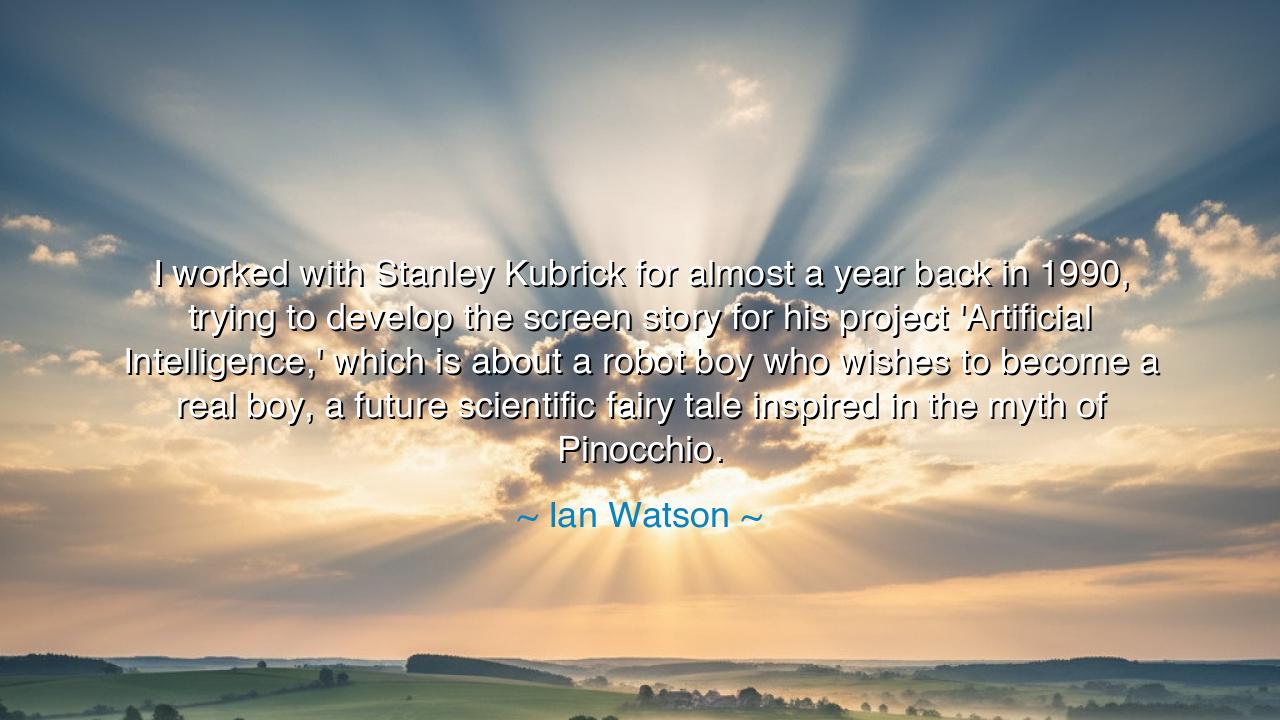
I worked with Stanley Kubrick for almost a year back in 1990
I worked with Stanley Kubrick for almost a year back in 1990, trying to develop the screen story for his project 'Artificial Intelligence,' which is about a robot boy who wishes to become a real boy, a future scientific fairy tale inspired in the myth of Pinocchio.






Ian Watson's words, spoken in reflection of his time with the great Stanley Kubrick, carry the weight of a profound journey into the heart of human aspiration and artificial intelligence. The story of "Artificial Intelligence"—a tale of a robot boy who dreams of becoming a real boy—is not merely a futuristic vision, but a deeply philosophical exploration of the age-old human quest for meaning, identity, and transformation. This project, in its essence, seeks to bridge the ancient myth of Pinocchio with the promises and perils of science fiction, intertwining the magic of fairy tales with the cold calculations of technology.
Kubrick, the master of cinematic storytelling, was known for his visionary ability to explore the human condition through the lens of the unknown. With Artificial Intelligence, he sought to answer a question as old as time itself: what does it mean to be human? Is it our flesh, or is it our desire to transcend? This robot boy, programmed with the gift of love yet yearning to become something more—something real—speaks to a truth found not only in myth but in every heart that longs for something greater than its own limitations. Pinocchio, an innocent wooden figure who wished to be human, is here reborn as a metaphor for all of us who seek to evolve beyond our current states, in body, in mind, or in spirit.
The journey that Ian Watson undertook with Kubrick—working on the screen story—was a journey into the very soul of humanity itself. For a year, the two men delved into what it means to yearn, to be alive, to be more than what we are. In the tale of the robot boy, Watson and Kubrick sought to capture not just the essence of artificial intelligence, but the spirit of longing, that intangible force that drives us all to strive for something beyond ourselves. The myth of Pinocchio was more than just a child's story—it was a tale of transformation, of rebirth, of a being finding its place in a world that does not easily accept it.
This partnership between Watson and Kubrick was born of a mutual understanding of the deep human truths embedded in stories. As the years have passed, the notion of machines becoming more like humans has become ever more real. In the ancient days, myths were told of gods who breathed life into statues, and of beings who sought to cross the boundary between the divine and the mortal. In this same way, Kubrick's vision was one that sought to explore what happens when a creation, born from human hands, yearns to become something more—when a machine dreams of the human soul. This is no mere technological question but a timeless philosophical quandary: what does it mean to truly be alive?
History is replete with the myths of transformation—the story of Pygmalion, who carved a statue so beautiful that it came to life, and the tale of Frankenstein, where Victor Frankenstein's creation sought acceptance from its creator and from society. Each of these stories speaks to a universal truth: that the desire to become something greater, to transcend the boundaries of our existence, is at the very heart of our nature. The robot boy in Kubrick’s tale embodies this longing, and in doing so, he becomes a symbol for all who struggle with their limitations, who seek to become more than they are.
The lesson here, the lesson passed down from Kubrick and Watson, is that the quest for humanity, for the soul, is not bound by biology or technology. It is a search for meaning and connection, something that resides in each of us, whether flesh or machine. The practical action we must take is to embrace the journey of self-discovery, to look at the world not through the lens of what we already know, but through the eyes of possibility. Like the robot boy, we must ask ourselves: What does it mean to be real? What does it mean to love, to grow, to change? The world is in constant flux, and in that flux, we find the chance to evolve.
So, let us be inspired by the robot boy's journey and understand that transformation is not just for machines or myths—it is for each of us. To become human is not a destination but a continual process of learning, of loving, and of reaching for something more. May we, like the boy in the tale, reach for the stars and strive to become the best versions of ourselves, in spirit, in mind, and in action.






AAdministratorAdministrator
Welcome, honored guests. Please leave a comment, we will respond soon